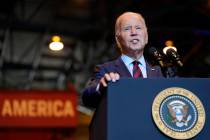EDITORIAL: UMC governance
Will University Medical Center be overseen by a governing board or merely an advisory board?
As reported Sunday by the Review-Journal’s Ben Botkin, the county ordinance that reforms the public hospital’s governance raises some questions about the authority of the panel. The commission clearly wanted more expertise in guiding the operations of UMC, which has lost hundreds of millions of dollars over the past decade and still relies on annual taxpayer bailouts to balance its books. But the state law under which the new hospital board was created specifically limits the panel to an advisory capacity.
The new board will be allowed to approve contracts worth up to $5 million, including contracts with doctors; hire, fire and evaluate UMC’s CEO; approve policies and procedures; develop a strategic plan; and recommend operating and capital budgets to the County Commission. These sure don’t seem like the powers of an advisory board.
“It’s an advisory board. It goes back to state law,” said Commissioner Chris Giunchigliani.
“I’m calling it a hospital board,” said consultant Larry Gage, who advised the commission on the governance change. “The statute uses the term advisory, but I see there’s nothing in the statute that says you have to call it an advisory board.”
Alrighty then. Next month, a recommending committee will nominate a slate of five to nine names for appointment to the board. Assuming the commission approves the nominations — commissioners must vote for the entire slate at once, minimizing the opportunity for political gamesmanship — the board would be seated in time to start work in January.
How people refer to the board’s role is less important than the work the board does. When the commission finally approved the governance change this year, after a yearlong turf war that prompted a minority to torpedo enabling legislation in Carson City, the goal was to seat board members with backgrounds in medicine, business and other fields suited to hospital management. Elected commissioners clearly lack the time and experience to turn around UMC — its losses came under their watch.
Commissioners retain the final say in the hospital’s biggest decisions, as they should. The hospital relies on public money, and commissioners are elected stewards.
However, for the governance change to have a chance to reverse UMC’s fortunes, commissioners have to give the board room to work. Politically motivated meddling will quickly drive away the kind of people the hospital desperately needs at the helm. The fiscal losses cannot continue. If this model collapses, UMC very well might follow suit.























